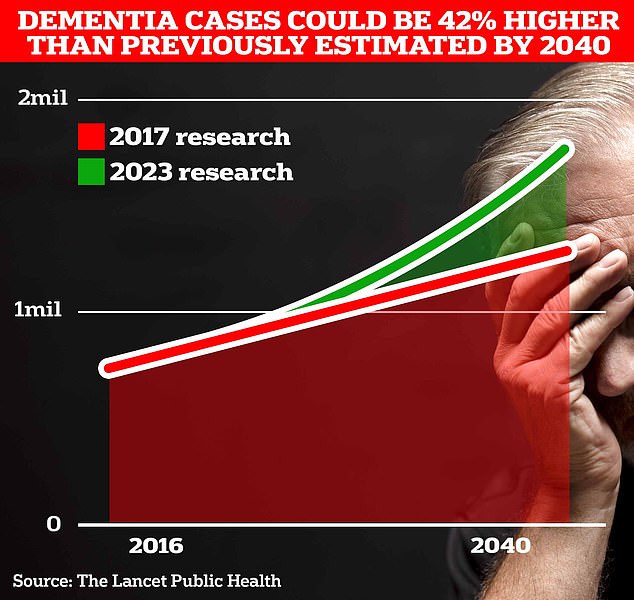Scientists pinpoint FIVE common medications that could raise dementia risk by up to 125%
A major new analysis involving more than 130million people has revealed that five types of commonly taken medications could raise the risk of dementia.
Antipsychotics, some medications for high blood pressure, diabetes medications, vitamins and supplements and antidepressants were linked to an increased chance of developing the disease.
Some types of antidepressants and antipsychotics, including SSRIs, were associated with up to 125 per cent increased risk of dementia diagnosis.
But the team behind the study, from the universities of Cambridge and Exeter, also found some drugs seemed to have the opposite effect.
Some vaccines, anti-inflammatory medicines and antibiotics were linked to a reduced risk of around 44 per cent.
Researchers said this was a promising finding and more must be done to see if these existing drugs could help tackle the condition, which is the biggest killer in Britain.
Dementia is a progressive disease that affects an estimated one million people in the UK and robs patients of their memory and independence.
While new breakthrough drugs to combat the condition are in development, scientists are also exploring if existing drugs could also help.

Medics identified antipsychotics, some medications for blood pressure, diabetes medications, vitamins and supplements plus antidepressants as potentially increasing the risk of dementia
In the analysis, published in Alzheimer’s and Dementia: Translational Research & Clinical Interventions, experts looked at data from 14 studies that tracked dementia diagnosis in more than 130 million people, as well as medications they had taken.
Researchers said that they discovered some 'candidates' that could warrant further studies as potential dementia treatments.
Having certain vaccines and taking antimicrobial treatments and anti-inflammatory drugs were linked to a decreased risk of developing dementia.
The vaccines that seemed to have this affect were those for hepatitis A, typhoid, hepatitis A and typhoid combined, and diphtheria.
Previous work has suggested that the BCG vaccine, which protects against tuberculosis, could also have a protective effect against Alzheimer’s disease.
Meanwhile, some antipsychotics, drugs for high blood pressure and diabetes and some antidepressants — including sertraline and escitalopram — were associated with a heightened risk.
But the authors stressed that this may not be due to the medications themselves, but a coincidence as people with dementia may be more likely to suffer conditions like depression and, therefore, need treatment.

Certain vaccines, antimicrobial treatments, anti-inflammatories and drugs to treat high blood pressure appeared to reduce a person’s risk of dementia
They described this as 'reverse causation' where dementia itself, which can lead to sufferers experiencing mood changes, is leading to higher prescriptions for antidepressants among this group.
Dr Ilianna Lourida from the University of Exeter, explained: 'Because a particular drug is associated with an altered risk of dementia, it doesn’t necessarily mean that it causes or indeed helps in dementia.
'We know that diabetes increases your risk of dementia, for example, so anyone on medication to manage their glucose levels would naturally also be at a higher risk of dementia – but that doesn’t mean the drug increases your risk.
'You should never change your medicine without discussing this first with your doctor, and you should speak to them if you have any concerns.'
Dr Ben Underwood, from the Department of Psychiatry at the University of Cambridge and Cambridgeshire and Peterborough NHS Foundation Trust, said the results suggesting some drugs helped ward off dementia was promising.
'We urgently need new treatments to slow the progress of dementia, if not to prevent it,' he said.
'If we can find drugs that are already licensed for other conditions, then we can get them into trials and – crucially – may be able to make them available to patients much, much faster than we could do for an entirely new drug.
'The fact they are already available is likely to reduce cost and, therefore, make them more likely to be approved for use in the NHS.'

Around 900,000 Britons are currently thought to have the memory-robbing disorder. But University College London scientists estimate this will rise to 1.7 million within two decades as people live longer. It marks a 40 per cent uptick on the previous forecast in 2017
Dr Richard Oakley, associate director of research and innovation at Alzheimer’s Society, said: 'If we can repurpose drugs that have already been shown to be safe and approved for use for other conditions, this could save millions of pounds and decades it takes to develop a new dementia drug from scratch, and get us closer to beating dementia.
'This research provides some initial groundwork and indicates which drugs have potential for being repurposed for dementia and should be prioritised for further investigation.
'But we can’t draw definite conclusions from this study alone. This was an observational study so more work is needed to understand the careful balance between how the drugs work, their specific doses, interactions with other drugs and the individual’s own health, and how that can impact a person’s risk of developing dementia.
'Clinical trials will help to answer some of these questions in the context of dementia.'
Dr Julia Dudley, head of research strategy at Alzheimer’s Research UK, added: 'As these medications have already been shown to be safe for use in people, this could potentially speed up the process of testing in clinical trials, as well as being significantly cheaper.
'Although these findings are interesting, it is too early to say if these medications can reduce the risk of dementia. Researchers will need to confirm these findings in clinical trials and investigate how these medications could potentially protect the brain against dementia.'
Recent analysis by the Alzheimer's Society estimated the overall annual cost of the dementia to the UK is £42billion a year, with families bearing the brunt.

But they can also be a sign of dementia — the memory-robbing condition plaguing nearly 1million Brits and 7million Americans
An ageing population means these costs – which include lost earnings of unpaid carers – are set to soar to £90billion in the next 15 years.
Around 944,000 in the UK are thought to be living with dementia while the figure is thought to be around 7million in the US.
Memory problems, thinking and reasoning difficulties and language problems are common early symptoms of the condition, which then worsen over time.
A separate Alzheimer's Research UK analysis found 74,261 people died from dementia in 2022 compared with 69,178 a year earlier, making it the country's biggest killer.




































































































































































































































































































































































